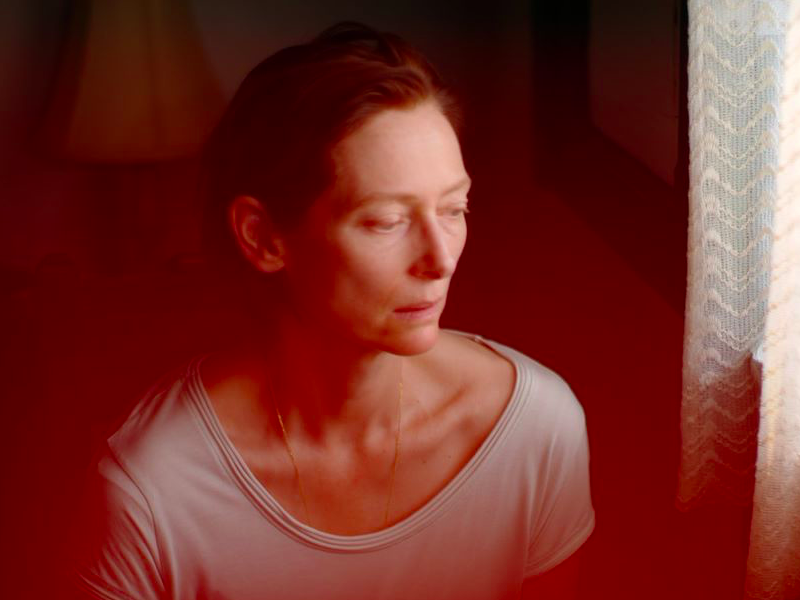
A British botanist from Scotland travels to Bogotá where she becomes transfixed by a strange and haunting noise. Trying to trace its origins, she finds her connection to her surroundings slowly unraveling instead.
EN
“For years I usually woke up after three hours of sleep, fresh. Then I entered a ‘drifting’ stage in which scenarios came and went. It was not typical dreaming because in it I was doing nothing but being a spectator. A few hours later, at dawn, the ‘bang’ arrived as a second wake-up call. The pleasure of the ‘bang’ expanded backwards to be included in the drifting terrain which now felt like a subterranean world. The images were dim, as if they were in a stage of decay. Logic was not clearly understood. Time decelerated. Would this feel like tapping into other people’s memories, or making a film in a foreign country. Possess/Possessed – an equilibrium state when the self is removed; when nothingness could mean freedom. Maybe this was the answer to everything, including Jessica/Tilda’s migration. In Bogotá and 300 km away in Pijao, as I was making Memoria, the morning ‘bang’ disappeared. With it the precious, murky, drifting realm was gone. For better or for worse, I could sleep for seven hours a night. This was another answer.”
Apitchatpong Weerasethakul1
“Ironically, given the number of delays caused by rain, now it’s sunshine that’s keeping the shoot hostage. The only item left on today’s schedule is the climax’s centerpiece, a wide shot that will extend across a full roll of film. A manifest tension reigns amongst the crew as we wait for clouds. The scene is of such dramatic complexity, even Tilda seems unsettled by the demands of her performance. An hour later, the sky is still clear but we’re nearing sunset and Sayombhu says there will be a 15-minute shooting window as the sun dips behind the mountains. Everything gets set up, the room is cleared of all but the essential crew, the door is closed, and the rest of us crowd around the monitor across the wall. The instant the light is right, the camera starts rolling. In the film, the characters will be navigating an intricately designed soundscape, reacting to a variety of auditory stimuli, but on set there is no substitute soundtrack to guide the actors. Instead, Apichatpong sits as close to them as possible and, speaking in a soft voice, describes sound cues along with the emotions and mental images they should elicit. His improvised narration becomes increasingly abstract as the scene nears its high point and it’s at once surreal and hypnotic to watch the actors give it form, interpreting his words in fluid, almost Tai chi-like motions. When Sayombhu calls, ‘Roll out!’, it provokes a violent jolt, as if a bubble containing the set suddenly burst. Reviewing the take on the video assist, Apichatpong is ecstatic: ‘It’s really, really beautiful. I don’t think we need the close-up, it’s not going to work. The other insert also won’t work. This works!’ We all go out on the porch so that Raúl [Locatelli, the sound recorder] can record a wild track inside the house. Waiting for him to finish, everyone stands mute and motionless, looking out at the view as the twilight grows darker, enveloped by a palpable air of relief. Euphoria, even.”
Giovanni Marchini Camia2
The Match Factory: Through the ‘bang’, Memoria, like some of your previous works, also delves into experiences and mysteries of sleeping and dreaming, interactions between different levels of sensory experience and consciousness. But in Memoria, there’s also the connection to sound itself, to what reverberates inside our heads. What other themes or ideas does the ‘bang’ connect to for you?
Apitchatpong Weerasethakul: Reflectively, the ‘bang’ in this film can be from many sources – those natural disasters or man-made ones. The fireworks, gunshots, or explosions that are associated with national traumas. I am also interested in the physical aspect of sound – the vibrations, the waves. How they relate to the idea of memory and its manifestation. I imagine the Colombian mountains, with their creases and creeks as being like the folds of the brain, or the curves of sound waves, as an expression of people’s remembrances through centuries. Equally important is the silence which accentuates the void or creates anticipation. Hidden in the sound design was also the first recorded audio from the late 19th Century. So, there are many layers at play.
The film also like certain past works evokes connection between its time and past times, both for the characters and through the lens of archaeology, or the human intervention into the ancient mountain and into nature. How would you describe the relationship between past and present as specifically relating to this film?
To me, Memoria presents the entanglement of memories, personal and collective. Jessica wakes up as an empty shell and absorbs memories of people and places. She’s the spirit of nothingness. She’s an amplifier (or as Hernan puts it, an antenna). The skull with a hole is to be filled or to be emptied out. We don’t know. This sign of humanity exists deep in the mountains, which in themselves are holding layers of memories. Jessica walks a lot, which to me is an elegant gesture, to trace and collect these layers. Then she sits down by the stream and listens. Finally she disappears like the radio waves that disperse in the evening air.
Apitchatpong Weerasethakul in conversation with The Match Factory3
- 1Apitchatpong Weerasethakul, Memoria (Berlin: Fireflies Press, 2021).
- 2Giovanni Marchini Camia, “Set Diary: Apichatpong Weerasethakul’s Memoria, pt. 6,” Film Comment, 25 February 2020.
- 3The Match Factory, “Interview with the director,”

